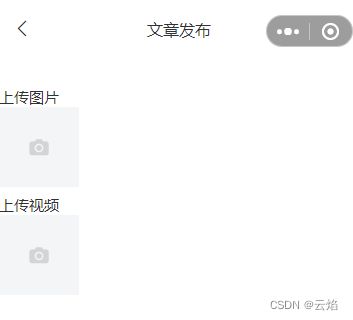uniapp开发移动端上传指南
介绍
Uniapp是 DCloud公司于2012年开始研发的能够一次代码开发,生成H5、小程序(微信、支付宝、百度、华为等)、APP等应用的技术的统称,开发工具是HBuilderX,功能非常强大,由此引申出许多技术社区与生态环境。
引言
Uniapp开发移动端上传,需要前端、后台接口的配合,是比较常见和通用的需求场景,包括许多细节的实现,如:前端上传页面ui,选择文件(图片或视频等),选择时上传文件大小的判断、上传状态的设定,上传后调用后台服务器上传接口上传到服务器,上传成功后回传参数处理等。还有些页面包括要上传多个图片、多个视频,混合搭配,如果没有好的代码封装,往往使得代码不易读、维护很困难。Uniapp提供的前端封装、以及我们使用相应后端接口,搭配好,可以形成一套比较简洁通用的实现方式。笔者根据以往经验进行总结如下。
实例
本文使用Uniapp开发(使用uview ui组件技术)前端微信小程序,后端接口采用TP6,实现移动端上传的功能
需求场景
发布内容管理资讯,包含上传图片、上传视频的表单,提交文件上传到服务器。
实现
前端页面
前端页面代码
export default {
data() {
return {
...
fileList1: [], fileList2: [],
}
},
...
methods:{
...
// 删除图片
deletePic(event) {
this[`fileList${event.name}`].splice(event.index, 1)
},
// 新增图片
async afterRead(event) {
// 当设置 mutiple 为 true 时, file 为数组格式,否则为对象格式
console.log("afterRead.event=",event);
let lists = [].concat(event.file)
let fileListLen = this[`fileList${event.name}`].length
lists.map((item) => {
this[`fileList${event.name}`].push({
...item, status: 'uploading', message: '上传中'
})
})
for (let i = 0; i < lists.length; i++) {
const result = await this.uploadFilePromise(lists[i].url);
console.log("afterRead.result=",result);
let item = this[`fileList${event.name}`][fileListLen]
this[`fileList${event.name}`].splice(fileListLen, 1, Object.assign(item, {
status: 'success',
message: '',
url: result,
}))
fileListLen++
}
//fileList1['url']保存了上传的图片保存路径
},
//上传限制
oversize(event){
console.log("oversize.event=",event);
if(event.name=='1'){ uni.$u.toast("上传图片最大不能超过5M" ) ; }
if(event.name=='2'){ uni.$u.toast("上传视频最大不能超过10M" ) ; }
},
uploadFilePromise(url) {
let _self=this;
return new Promise((resolve, reject) => {
let a = uni.uploadFile({
url: this.apiUrl+'/api/upload/uploadFile', // 仅为示例,非真实的接口地址
header:{authorization:_self.auth_token},
filePath: url, name: 'file',
// formData: { user: 'test' },
success: (res) => {
console.log("uploadFilePromise.success.res=",res);
let jsonData=JSON.parse(res.data);//res.data.data
let result=jsonData.data.photo;
setTimeout(() => {
resolve(result)
}, 1000) ;
}
});
// console.log("uploadFilePromise.a=",a);
})
},
}
}
其中,deletePic(删除)、afterRead(读取后处理)、oversize(上传限制)、都是通用函数,使用事件参数event判断不同控件,实现了图片、视频这2个字段域的上传处理。uploadFilePromise(上传处理)函数也是通用调用后台接口实现的,其中参数header中包含认证token传递给后端,约定上传前必须用户先登录,获得认证token后作为上传参数传递给接口,用于判断是谁上传文件,防止不法分子上传服务器占用资源。起到一定安全作用。
后台接口实现
接口路径:/api/upload/uploadFile
实现代码
class Upload extends BaseApi{
public function uploadFile(Request $request){
date_default_timezone_set("Asia/Shanghai"); //设置时区
$token=$request->header('authorization');//$request->param('token');
$jwt=new JwtService();
$deDatas=$jwt->decodeToken($token,Config::get('app.jwt_scene_apiLogin'));
$uid=null;
try {
if($deDatas['code']==parent::SUCCESS_CODE){
$deData= $deDatas['data'];
$uid=$deData['user']['id'];
if(empty($uid)){
return json_response(-1, "登录用户无效.");
}
}else{
return json_response($deDatas['code'], $deDatas['msg']);
}
$code = $_FILES['file'];//获取小程序传来的图片
if(is_uploaded_file($_FILES['file']['tmp_name'])) {
//把文件转存到你希望的目录(不要使用copy函数)
$uploaded_file=$_FILES['file']['tmp_name'];
//我们给每个用户动态的创建一个文件夹
$uppath_pos_pre=app()->getRootPath().'/Data/UploadFiles';//Config::get('app.uppath_pos_pre')
$user_path=$uppath_pos_pre.'/users/uid-'.$uid;//$_SERVER['DOCUMENT_ROOT']."/m_pro/".$username;
//判断该用户文件夹是否已经有这个文件夹
if(!file_exists($user_path)) {
//mkdir($user_path);
mkdir($user_path,0777,true);
}
$file_true_name=$_FILES['file']['name'];
$fileName=date("Ymd")."-".time().rand(1,1000).substr($file_true_name,strrpos($file_true_name,"."));
$move_to_file=$user_path."/".$fileName;//strrops($file_true,".")查找“.”在字符串中最后一次出现的位置
$savaPath='users/uid-'.$uid."/".$fileName;
//echo "$uploaded_file $move_to_file"; iconv("utf-8","gb2312",$move_to_file)
if(move_uploaded_file($uploaded_file,$move_to_file)) {
// return $_FILES['file']['name']."--上传成功".date("Y-m-d H:i:sa");
$datas=['photo'=>$savaPath];
return json_response(parent::SUCCESS_CODE, 'success',$datas);//上传成功
} else {
// return "上传失败".date("Y-m-d H:i:sa");
return json_response(-3, "上传失败1" );
}
} else {
return json_response(-9, "上传失败2" );//"上传失败".date("Y-m-d H:i:sa");
}
} catch (Exception $e) {
log_prepend("uploadFile.Exception==".serialize($e),'debug_api_Upload.txt');
return json_response($e->getCode(), $e->getMessage());
}
}
}运行后的效果

